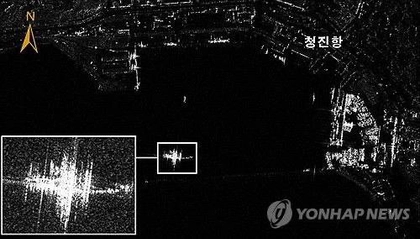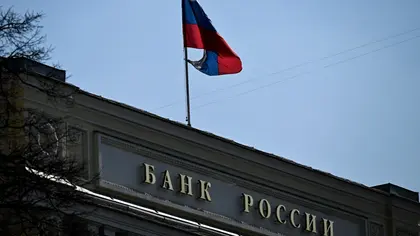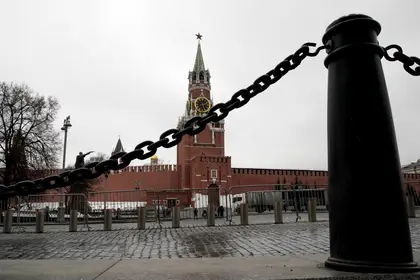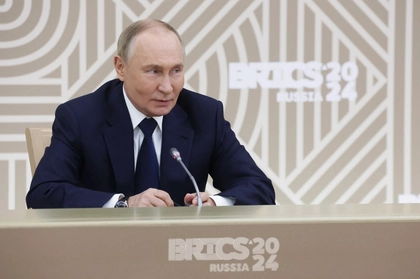There are some serious economic jitters in Russia right now as the country’s currency plummets and financial authorities scramble to limit the damage.
What’s the latest?
JOIN US ON TELEGRAM
Follow our coverage of the war on the @Kyivpost_official.
Russia’s central bank on Tuesday hiked its key interest rate from 8.5 to 12 percent, after the ruble crashed to a more than 16-month low against the dollar the previous day.
“This decision was taken in order to limit the risks to price stability,” the central bank said, after convening for an extraordinary meeting earlier in the day.
The ruble has shed around 30 percent of its value against the dollar since the start of the year, as Moscow grapples with falling export revenues, rising imports and higher military spending.
Why is a falling ruble bad?
If you’re Russian, it simply means the value of the money in your pocket or bank account is decreasing and you can buy less and less with the same amount of money.
This is already being in felt among the population – retired businessman Igor Inkin told AFP this week he is preparing to turn down simple pleasures like dessert as the value of the ruble in his pocket continues to slide.
“Prices in the shops are going up and we’re having to adjust our expenditures. It’s very unsettling,” Inkin said.
“We are denying ourselves many, many things... sweets and so on.”
Why is the falling ruble good?

Up to 12,000 North Korean Troops Transferred to Russia, Satellite Images Show
If you’re not Russian, it’s a sign that sanctions and international isolation in the wake of Moscow’s full-scale invasion of Ukraine are having an effect and the longer it continues, the more chance there is that discontent with President Vladimir Putin will grow.
What’s caused the latest drop?
The ruble has suffered since the beginning of Russia’s full-scale invasion of Ukraine, in particular due to sanctions that limit Russia’s oil and gas revenues and, on the other hand, to capital outflows.
Then there are two other factors for its most recent and very dramatic drop.
Firstly, Ukraine’s drone strikes on a high-end financial district of Moscow have prompted Russian society to see that there are increasing risks to Russia’s economy.
Secondly, mounting uncertainty as to how the Russian Ministry of Finance would – or could – maintain an exchange rate closer to 90 against the dollar.
Today’s rise in interest rates is an attempt to do just this.
What does raising the interest rates mean?
Serhiy Fursa, a Ukrainian financial analyst, told Kyiv Post: “This is an attempt to prevent further devaluation of the ruble at all costs.
“In classical economics, the process works like this: by raising the rate, investment in the country becomes more attractive.
“This helps prevent currency devaluation since a significant amount of capital flows into the country due to the influx of so-called ‘hot money’ for speculative purposes.”
Economist Oleksandr Lugovsky, told Kyiv Post, that the central bank is also hoping to give savers a boost, saying: “Ruble-denominated savings are now more attractive as they earn more interest, which stimulates savings and helps ruble appreciation.”
Will it work?
Fursa says it’s unlikely – due to sanctions and the fact that Russia isn’t exactly the most attractive place to invest in right now, so there isn’t much chance of lots of foreign money pouring in.
He also highlights the two longer-term factors affecting the ruble’s value mentioned above – sanctions affecting Russia’s oil and gas revenues and capital outflows.
“Raising the interest rates will not directly address these factors,” he says. “Hence, using this method to stave off ruble devaluation for an extended period is doubtful.”
How will this further impact Russians?
Well, aside from not being able to afford sweets and desserts because the ruble is worth less, they now have to contend with the effects of higher interest rates.
Lugovsky says: “In the end, economic activity declines, tax revenue shrinks and if the government wishes to maintain the same level of expenses – in the case of Russia that means financing the war effort – then the government surplus declines or becomes a deficit.
“If the government has a deficit it will either dip into reserves, increase the tax base, or resort to borrowing.”
In short, it’s not good news for the Kremlin
You can also highlight the text and press Ctrl + Enter






